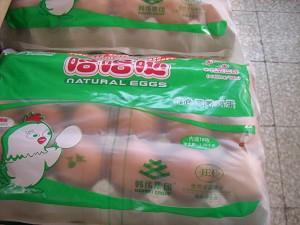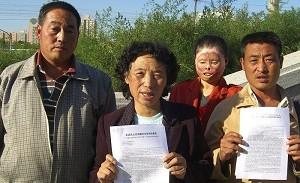Since April 2006, a large number of chickens have died in a one month period in China’s largest chicken farm - Dalian Hanwei Enterprises Group Co. in Dalian city. Although local residents believe the “bird flu” virus caused the deaths and the local government has issued a notice to stop the sale of chicken droppings and dead chickens, there were no media reports on the incident. The Epidemic Prevention and Control Department also failed to warn the public about the situation. Presently, the farm continues to sell eggs to various places. Within the first ten days of the breakout, many dead chickens were cleaned (feathers pulled out) in the neighboring village and dispatched to other locations to be manufactured into roast chickens then sold to markets in Dalian city.
Hanwei chicken farm is the largest chicken farm in China occupying 200 hectares in land and located on five mountains, surrounded by the sea on three sides, in Dongnihe village, Sanjianbao town, Daling city. The company produces the “Ge Ge Da” brand of green (organic) eggs that is sold to various major markets in China and abroad. The farm breeds approximately three million chickens in 300 chicken houses. After numerous investigations by reporters, it has been revealed that the chickens in the southern farm were probably all dead. Currently, only eggs from the northern farm are seen shipped out for sale. The total number of chickens in the southern and northern farms is unknown, but the number of dead chickens is estimated to be over 1 million.
This chicken farm is tightly guarded, with one of the entrances having three guards. On April 11, some local farmers familiar with the internal workings of the chicken farm indicated that dead chickens are abundant.
Starting mid-April, chickens died en masse. Some experts visited the farm on May 1, but failed to control it and the death continued. Many local farmers also indicated that chickens died in large quantities. Some farmers also stated that at the beginning of the epidemic in mid-April, many cars coming out of the farm were shipping out the dead chickens. Local farmers were hired to clean the chickens and then they were shipped to other factories to produce roast chicken, and then sold to Dalian. Neighboring farmers all reminded each other not to buy cooked chickens in Dalian as these dead chickens were all sold to Dalian.
The farmers hired to clean the chickens are from Dongnihe village, where the chicken farm is located, and the neighboring Xujiayao village. A few farmers still kept the big pots used to clean the chickens. The farmers indicated that it was Hanwei Group’s chairman’s father-in-law who arranged the chickens to Xujiayao village. Chairman Han Wei’s wife is the “38 red-banner pacesetter” (an honorary title for woman in China) in 2006.
As of now, the local government and the chicken farm still claims that it was “chicken pest” not “bird flu” as the cause of death. But local farmers have expressed doubts and no media has reported about this matter yet. The local farmers said, “why doesn’t the media report such a major event? It is because the Hanwei Group has money and power, and the government does not respect the safety of our people’s lives.”
Dalian residents also revealed that one week ago, Dalian television station broadcasted how reliable Hanwei Group’s “Ge Ge Da” eggs were and asked people to buy them with confidence. Major Beijing markets are still selling the “Ge Ge Da” eggs now.
It has not been verified whether this chicken farm was been attacked by “bird flu”. Since the experts visited the farm on May 1, the “chicken pest” epidemic has not been stopped and hens continued to die. Local farmers do not believe this is a simple “chicken pest” matter.
After May 1, the nearby villages suddenly stopped processing dead chickens. The farmers hired to clean chickens denied everything when asked by reporters, and said: “who dares to do such a thing that may cost our life.”
The method of treating the dead chickens was changed from selling to burying. On May 12, a local farmer who conducts business with the chicken farm said that the dead chickens had been buried inside the farm. Farms in the neighborhood also said they saw several big holes at the chicken farm.
On May 10, the local district and town government issued an order to forbid farmers from taking chicken droppings from the farm or would be fined up to several thousand yuan. Before May 10, there were many cars from the chicken farm transporting the chicken droppings to neighboring farmland for use everyday. The local farmers also stated they saw eggs shipped into the farm, wrapped with the “Ge Ge Da” brand packing, then shipped out for sale.
“Ge Ge Da” eggs are sold to local areas in China such as Shanghai, Beijing, Tianjin, Dalian, Harbin, Zhangchun, Shenyang, Qingdao, Weihai, Fushun, etc. The eggs are also sold abroad to Japan, South Korea, Singapore, Hong Kong, and Macao. Nearly a thousand chain supermarkets, such as Shanghai’s Hualian, Lianhua, Jiadeli, Lego, Beijing’s Wolma, Jialefu, Yansuo, and Wumei, are selling the eggs at a price three times higher than the regular market price of six yuan per catty (equal to half kilogram).
Hanwei Enterprises Group Co.’s Chairman Han Wei grew up in Donghe village, and used to work for the local government. He is now a member of the national political committee and the chairman of the Chinese Poultry Industry Association.
Han has talked to the media several times that, “bird flu can be prevented and is controllable, people do not have to be overly frightened. Hanwei Group has 23 years of breeding experience, there has never been a single case of bird flu breakout.”




